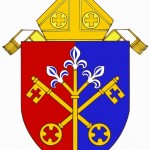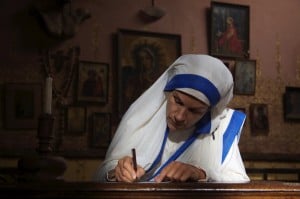 A guest post by Deacon Jerry Schiffer
A guest post by Deacon Jerry Schiffer
Today is the 21st Sunday in Ordinary Time and today’s readings offer a look at a foundational Catholic teaching that is often contested in the rest of the Christian world.
At issue is the establishment of Peter as the head of Christ’s Church on earth. Supporting that premise – from a Catholic standpoint—are the following verses:
And so I say to you, you are Peter,
and upon this rock I will build my church,
and the gates of the netherworld shall not prevail against it.I will give you the keys to the kingdom of heaven.
Whatever you bind on earth shall be bound in heaven;
and whatever you loose on earth shall be loosed in heaven.”
To many, it is this passage that justifies the Church’s teaching that Peter has been named the leader of the Church with the charism of infallibility. He is, after all, the “rock” that Jesus refers to, is he not? The rock upon whom the Church will be built?
Well, yes and no.
Preceding the words of the Gospel cited above is another relevant passage which is often used to contest these conclusions regarding Peter. Perhaps you will remember this exchange between Jesus and his disciples:
“But who do you say that I am?”
Simon Peter said in reply,
“You are the Christ, the Son of the living God.”Jesus said to him in reply,
“Blessed are you, Simon son of Jonah.
For flesh and blood has not revealed this to you,
but my heavenly Father.
Enter the controversy:
At issue is the meaning of the term “rock” in the declaration by Jesus that “. . . you are Peter and upon this rock I will build my church.”
Books have been written about this very topic, defending or attacking the Catholic understanding of this passage. Some examine the original Greek; others consider the message in Jesus’ spoken Aramaic. All lobby for position in the debate, with the institution of the papacy hanging in the balance.
Those who find no scriptural basis for the institution of the papacy typically argue that in using the term “rock,” Jesus is not referring to Peter, but rather to Peter’s confession that Jesus is “the Christ, the Son of the living God.” Catholic apologists typically understand “rock” to refer to Peter, himself, thus justifying the Catholic teaching regarding Peter and the papacy. So when the occasional Catholic commentator adopts the ‘Protestant’ position that the “rock” refers to Peter’s confession, eyebrows are understandably raised.
To the rescue, it appears, comes an old stalwart of Catholicism – “both/and” theology. This approach to the study of God offers premises such as: Christian life is based on both Christian Scripture and Tradition; that we can know God by virtue of both faith and reason; that salvation results both from God’s gift of grace and our response to that gift, and so on.
Well, by now you know where this is going. With “both/and” vision, we can understand the “rock” as both Peter and his confession of faith. Witness these offerings from the Catholic Catechism:
881 The Lord made Simon alone, whom he named Peter, the “rock” of his Church. He gave him the keys of his Church and instituted him shepherd of the whole flock. “The office of binding and loosing which was given to Peter was also assigned to the college of apostles united to its head.” This pastoral office of Peter and the other apostles belongs to the Church’s very foundation and is continued by the bishops under the primacy of the Pope.
424 Moved by the grace of the Holy Spirit and drawn by the Father, we believe in Jesus and confess: ‘You are the Christ, the Son of the living God. On the rock of this faith confessed by St. Peter, Christ built his Church.
552 Simon Peter holds the first place in the college of the Twelve; Jesus entrusted a unique mission to him. Through a revelation from the Father, Peter had confessed: “You are the Christ, the Son of the living God.” Our Lord then declared to him: “You are Peter, and on this rock I will build my Church, and the gates of Hades will not prevail against it.” Christ, the “living Stone”, thus assures his Church, built on Peter, of victory over the powers of death. Because of the faith he confessed Peter will remain the unshakable rock of the Church. His mission will be to keep this faith from every lapse and to strengthen his brothers in it.
From all of this we can perhaps draw the following conclusions: First, you can understand “rock” as both Peter and his confession of faith – that vital principle that Jesus is the Christ, the Son of the living God. And second, however you understand it, the Catholic Church will always consider Peter the first pope and Benedict as a direct successor, and both with the charism of infallibility.
Happy 21st Sunday in Ordinary Time!











